| Listing 1 - 6 of 6 |
Sort by
|
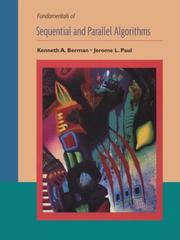
ISBN: 9780534946746 0534946747 Year: 1997 Publisher: Boston (Mass.): PWS publ,
Abstract | Keywords | Export | Availability | Bookmark
 Loading...
Loading...Choose an application
- Reference Manager
- EndNote
- RefWorks (Direct export to RefWorks)
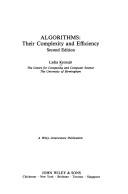
ISBN: 0471908142 9780471908142 Year: 1985 Publisher: Chichester Wiley
Abstract | Keywords | Export | Availability | Bookmark
 Loading...
Loading...Choose an application
- Reference Manager
- EndNote
- RefWorks (Direct export to RefWorks)
Computer science --- Computer algorithms. --- Computer programming. --- Mathematics --- Parallel processing (Electronic computers). --- Sequential processing (Computer science). --- Data processing. --- Computer algorithms --- Computer programming --- Parallel processing (Electronic computers) --- Sequential processing (Computer science) --- Computers --- Electronic computer programming --- Electronic data processing --- Electronic digital computers --- Programming (Electronic computers) --- Coding theory --- High performance computing --- Multiprocessors --- Parallel programming (Computer science) --- Supercomputers --- Algorithms --- Data processing --- Programming --- Parallelism --- Computational Complexity --- Np Complete
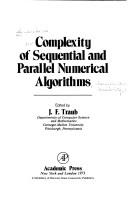
ISBN: 0126975507 9780126975505 Year: 1973 Publisher: New York (N.Y.): Academic press
Abstract | Keywords | Export | Availability | Bookmark
 Loading...
Loading...Choose an application
- Reference Manager
- EndNote
- RefWorks (Direct export to RefWorks)
Electronic digital computers --- Mathematics --- Algorithms --- Parallel processing (Electronic computers) --- Sequential processing (Computer science) --- Programmation des ordinateurs --- Mathématiques --- Algorithmes --- Parallélisme (Informatique) --- Programming --- Data processing --- Informatique --- Computer algorithms --- Computer programming --- -Parallel processing (Electronic computers) --- #TCPW P4.0 --- #TCPW P4.6 --- #TCPW P3.0 --- 681.3*F21 --- Computers --- Electronic computer programming --- Electronic data processing --- Programming (Electronic computers) --- Coding theory --- High performance computing --- Multiprocessors --- Parallel programming (Computer science) --- Supercomputers --- Math --- Science --- Numerical algorithms and problems: computation of transforms; computations infinite fields; computations on matrices; computations on polynomials; numer-theoretic computations--See also {681.3*G1}; {681.3*G4}; {681.3*I1} --- Computer algorithms. --- Computer programming. --- Data processing. --- Parallel processing (Electronic computers). --- Sequential processing (Computer science). --- 681.3*F21 Numerical algorithms and problems: computation of transforms; computations infinite fields; computations on matrices; computations on polynomials; numer-theoretic computations--See also {681.3*G1}; {681.3*G4}; {681.3*I1} --- Mathematics - Data processing --- Computational Complexity --- Algorithm Analysis --- Numerical Software
Book
ISBN: 184882257X 1848822588 Year: 2010 Publisher: London : Springer London : Imprint: Springer,
Abstract | Keywords | Export | Availability | Bookmark
 Loading...
Loading...Choose an application
- Reference Manager
- EndNote
- RefWorks (Direct export to RefWorks)
Communicating Sequential Processes (CSP) has been used extensively for teaching and applying concurrency theory, ever since the publication of the text Communicating Sequential Processes by C.A.R. Hoare in 1985. Both a programming language and a specification language, CSP helps users to understand concurrent systems, and to decide whether a program meets its specification. As a member of the family of process algebras, the concepts of communication and interaction are presented in an algebraic style. An invaluable textbook/reference on the state of the art in CSP, Understanding Concurrent Systems also serves as a comprehensive introduction to the field, in addition to providing material for a number of more advanced courses. A first point of reference for anyone wanting to use CSP or learn about its theory, the book also introduces other views of concurrency, using CSP to model and explain these. The text is fully integrated with CSP-based tools such as Failures-Divergences Refinement (FDR), and describes how to create new tools based on FDR. Most of the book relies on no previous knowledge of the theoretical background other than a basic knowledge of sets and sequences. Sophisticated mathematical arguments are avoided whenever possible. Topics and features: Presents a comprehensive, accessible introduction to CSP Discusses the latest advances in CSP, giving novel presentations of its operational and algebraic semantics as well as the first comprehensive survey of its hierarchy of behavioural denotational models Explores the practical application of CSP, including timed modelling, discrete modelling, parameterised verifications and the state explosion problem, as well as advanced topics in the use of FDR Examines the ability of CSP to describe and enable reasoning about parallel systems modelled in other paradigms including two chapters on shared variable programming Covers a broad variety of concurrent systems, including combinatorial, timed, priority-based, mobile, shared variable, statecharts, buffered and asynchronous systems Contains ample exercises and case studies to support the text and aid in the explanation Supplies further tools and information at the associated website: http://www.comlab.ox.ac.uk/ucs/ From undergraduate students of computer science in need of an introduction to the area, to researchers and practitioners desiring a more in-depth understanding of theory and practice of concurrent systems, this broad-ranging text/reference is essential reading for anyone interested in Hoare's CSP. Bill Roscoe has been Head of Department at Oxford University Computing Laboratory since 2003 and a Professor of Computer Science there since 1997. He is a Fellow of University College, Oxford and co-Director of the James Martin Institute for the Future of Computing. He is also co-editor of the Springer book Reflections on the Work of C.A.R. Hoare.
Parallel processing (Electronic computers) --- Sequential processing (Computer science) --- Engineering & Applied Sciences --- Computer Science --- Computer science. --- Operating systems (Computers). --- Computer logic. --- Computer Science. --- Operating Systems. --- Logics and Meanings of Programs. --- High performance computing --- Multiprocessors --- Parallel programming (Computer science) --- Supercomputers --- Logic design. --- Design, Logic --- Design of logic systems --- Digital electronics --- Electronic circuit design --- Logic circuits --- Machine theory --- Switching theory --- Computer operating systems --- Computers --- Disk operating systems --- Systems software --- Operating systems --- Computer science logic --- Logic, Symbolic and mathematical
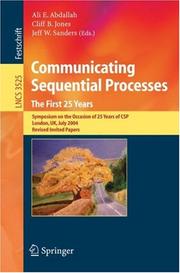
ISBN: 9783540258131 3540258132 3540322655 Year: 2005 Publisher: Berlin ; New York : Springer,
Abstract | Keywords | Export | Availability | Bookmark
 Loading...
Loading...Choose an application
- Reference Manager
- EndNote
- RefWorks (Direct export to RefWorks)
This volume, like the symposium CSP25 which gave rise to it, commemorates the semi-jubilee of Communicating Sequential Processes. 1 Tony Hoare’s paper “Communicating Sequential Processes” is today widely regarded as one of the most in?uential papers in computer science. To comm- orate it, an event was organized under the auspices of BCS-FACS (the British Computer Society’s Formal Aspects of Computing Science specialist group). CSP25 was one of a series of such events organized to highlight the use of formal methods, emphasize their relevance to modern computing and promote their wider application. BCS-FACS is proud that Tony Hoare presented his original ideas on CSP at one of its ?rst meetings, in 1978. The two-day event, 7–8 July 2004, was hosted by London South Bank U- versity’s Institute for Computing Research, Faculty of Business, Computing and Information Management. The intention was to celebrate, re?ect upon and look beyondthe?rstquarter-centuryofCSP’scontributionstocomputerscience. The meeting examined the impact of CSP on many areas stretching from semantics (mathematical models for understanding concurrency and communications) and logic(forreasoningaboutbehavior),throughthedesignofparallelprogramming languages (i/o, parallelism, synchronization and threads) to applications va- ing from distributed software and parallel computing to information security, Web services and concurrent hardware circuits. It included a panel discussion with panelists Brookes, Hoare, de Roever and Roscoe (chaired by Je? Sanders), poster presentations by PhD students and others, featured a ?re alarm (requ- ing evacuation in the rain!) and concluded with the presentation of a fountain pen to Prof. Sir C. A. R. Hoare.
Computer programming --- Parallel processing (Electronic computers) --- Programmation (Informatique) --- Parallélisme (Informatique) --- Congresses. --- Congrès --- CSP (Computer program language) --- Parallel programming (Computer science) --- Sequential processing (Computer science) --- Computer Science --- Engineering & Applied Sciences --- Cross System Product (Computer program language) --- Computer science. --- Computer programming. --- Software engineering. --- Programming languages (Electronic computers). --- Computer logic. --- Computer Science. --- Logics and Meanings of Programs. --- Programming Languages, Compilers, Interpreters. --- Software Engineering. --- Programming Techniques. --- Computer science logic --- Logic, Symbolic and mathematical --- Computer languages --- Computer program languages --- Computer programming languages --- Machine language --- Electronic data processing --- Languages, Artificial --- Computer software engineering --- Engineering --- Computers --- Electronic computer programming --- Electronic digital computers --- Programming (Electronic computers) --- Coding theory --- Informatics --- Science --- Programming --- Programming languages (Electronic computers) --- Logic design. --- Design, Logic --- Design of logic systems --- Digital electronics --- Electronic circuit design --- Logic circuits --- Machine theory --- Switching theory --- Compilers (Computer programs). --- Computer Science Logic and Foundations of Programming. --- Compilers and Interpreters. --- Compiling programs (Computer programs) --- Computer programs --- Programming software --- Systems software
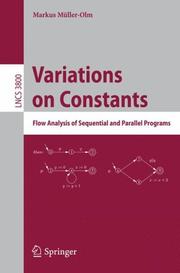
ISBN: 9783540453857 3540453857 3540453865 Year: 2006 Publisher: Berlin ; New York : Springer,
Abstract | Keywords | Export | Availability | Bookmark
 Loading...
Loading...Choose an application
- Reference Manager
- EndNote
- RefWorks (Direct export to RefWorks)
Program analysis is concerned with techniques that automatically determine run-time properties of given programs prior to run-time. It is used for validation in order to ensure that programs serve their intended purpose and in further processing for efficient execution such as in optimizing compilers. Optimal program analysis provides a guarantee about the precision of the computed results. This monograph, a revised version of the author's habilitation thesis, focusses on optimal flow analysis of sequential and parallel programs. It studies algorithmic properties of various versions of the well-known constant-propagation problem. In order to come to grips with the variants considered, it combines techniques from different areas such as linear algebra, computable ring theory, abstract interpretation, program verification, complexity theory, etc. Combination of techniques is the key to further progress in automatic analysis and constant-propagation allows us to illustrate this point in a theoretical study. After a general overview, the monograph consists of three essentially self-contained parts that can be read independently of each other. These parts study: a hierarchy of constants in sequential programs, inherent limits of flow analysis of parallel programs, and how to overcome these limits by abandoning a classic atomic execution assumption.
Parallel programming (Computer science) --- Sequential processing (Computer science) --- Mathematical constants. --- Variables (Mathematics) --- Computer programs --- Programmation parallèle (Informatique) --- Constantes (Mathématiques) --- Variables (Mathématiques) --- Correctness. --- Mathematical constants --- Computer Science --- Engineering & Applied Sciences --- Correctness --- Information Technology --- Software Engineering --- Correctness of computer programs --- Program correctness (Computer science) --- Constants, Mathematical --- Computer science. --- Software engineering. --- Programming languages (Electronic computers). --- Computers. --- Computer logic. --- Computer Science. --- Theory of Computation. --- Software Engineering. --- Logics and Meanings of Programs. --- Programming Languages, Compilers, Interpreters. --- Computer science logic --- Logic, Symbolic and mathematical --- Automatic computers --- Automatic data processors --- Computer hardware --- Computing machines (Computers) --- Electronic brains --- Electronic calculating-machines --- Electronic computers --- Hardware, Computer --- Computer systems --- Cybernetics --- Machine theory --- Calculators --- Cyberspace --- Computer languages --- Computer program languages --- Computer programming languages --- Machine language --- Electronic data processing --- Languages, Artificial --- Computer software engineering --- Engineering --- Informatics --- Science --- Debugging in computer science --- Mathematics --- Functions --- Computer programming --- Parallel processing (Electronic computers) --- Information theory. --- Logic design. --- Design, Logic --- Design of logic systems --- Digital electronics --- Electronic circuit design --- Logic circuits --- Switching theory --- Communication theory --- Communication
| Listing 1 - 6 of 6 |
Sort by
|

 Search
Search Feedback
Feedback About UniCat
About UniCat  Help
Help News
News